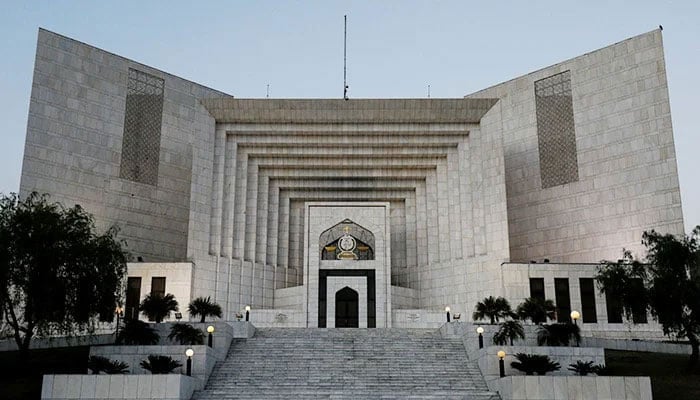SC grants Sindh AG time to seek instructions as it recommends provincial legislation
ISLAMABAD: The Supreme Court on Monday adjourned the hearing while maintaining the injunction against the high court decision to return the tax collected in the cantonment boards.
A five-member larger bench headed by Justice Mansoor Ali Shah heard the case. During the hearing, the court recommended provincial legislation on the matter, on which the Sindh advocate general pleaded for the adjournment of the case and said they should be given time to take instructions from the provincial government on the court's recommendation.
The court, after accepting the request of the provincial law officer, adjourned the hearing until April 22. The court, however, declared that the cantonment boards can collect taxes under the 1958 Act and the injunction against the decision of the Sindh High Court to refund the tax collected so far would remain intact.
Earlier, during the course of the hearing, the attorney general argued that a presidential order was issued in 1979 on the Property Tax Act of 1958, and through the Eighth Amendment, Zia-ul-Haq gave constitutional protection to this presidential order in 1985.
The AG submitted that even in 2010, the matter was not touched in the Eighteenth Amendment. He submitted that the collection of tax by cantonment boards is a federal, not a provincial subject.
On this occasion, Barrister Ayan Memon told the court that during 1988 in the Benazir Bhutto case, the Supreme Court held that the clauses that were protected under Article 270 of the constitution can be reviewed.
At this, Justice Mansoor Ali Shah asked as to why the Sindh government does not make this law a provincial matter by enacting legislation. The Sindh advocate general however sought time for taking instructions from the provincial government. The court, while giving time to the advocate general asked him to inform it after seeking instructions from the provincial government.
-
 Jerome Tang Calls Out Team After Embarrassing Home Defeat
Jerome Tang Calls Out Team After Embarrassing Home Defeat -
 Cynthia Erivo Addresses Bizarre Rumour About Her Relationship With Ariana Grande
Cynthia Erivo Addresses Bizarre Rumour About Her Relationship With Ariana Grande -
 Prince Harry, Meghan Markle Spotted Cosying Up At NBA All-Star Game
Prince Harry, Meghan Markle Spotted Cosying Up At NBA All-Star Game -
 Lady Gaga Explains How Fibromyalgia Lets Her 'connect With People Who Have It'
Lady Gaga Explains How Fibromyalgia Lets Her 'connect With People Who Have It' -
 Metro Detroit Weather Forecast: Is The Polar Vortex Coming Back?
Metro Detroit Weather Forecast: Is The Polar Vortex Coming Back? -
 Daniel Radcliffe Reveals Surprising Way Fatherhood Changed Him
Daniel Radcliffe Reveals Surprising Way Fatherhood Changed Him -
 ‘Disgraced’ Andrew At Risk Of Breaking Point As Epstein Scandal Continues
‘Disgraced’ Andrew At Risk Of Breaking Point As Epstein Scandal Continues -
 Alan Cumming Shares Plans With 2026 Bafta Film Awards
Alan Cumming Shares Plans With 2026 Bafta Film Awards -
 OpenClaw Founder Peter Steinberger Hired By OpenAI As AI Agent Race Heats Up
OpenClaw Founder Peter Steinberger Hired By OpenAI As AI Agent Race Heats Up -
 Kate Middleton's Reaction To Harry Stepping Back From Royal Duties Laid Bare
Kate Middleton's Reaction To Harry Stepping Back From Royal Duties Laid Bare -
 Rose Byrne Continues Winning Streak After Golden Globe Awards Victory
Rose Byrne Continues Winning Streak After Golden Globe Awards Victory -
 Ice Hockey Olympics Update: Canada Stays Unbeaten With Dominant Win Over France
Ice Hockey Olympics Update: Canada Stays Unbeaten With Dominant Win Over France -
 Brooklyn Beckham Makes This Promise To Nicola Peltz Amid Family Feud
Brooklyn Beckham Makes This Promise To Nicola Peltz Amid Family Feud -
 Chinese New Year Explained: All You Need To Know About The Year Of The Horse
Chinese New Year Explained: All You Need To Know About The Year Of The Horse -
 Canadian Passport Holders Can Now Travel To China Visa-free: Here's How
Canadian Passport Holders Can Now Travel To China Visa-free: Here's How -
 Maya Hawke Marries Christian Lee Hutson In New York Ceremony
Maya Hawke Marries Christian Lee Hutson In New York Ceremony




